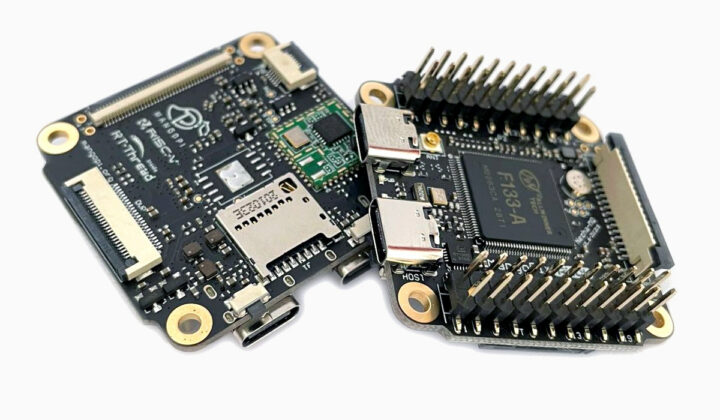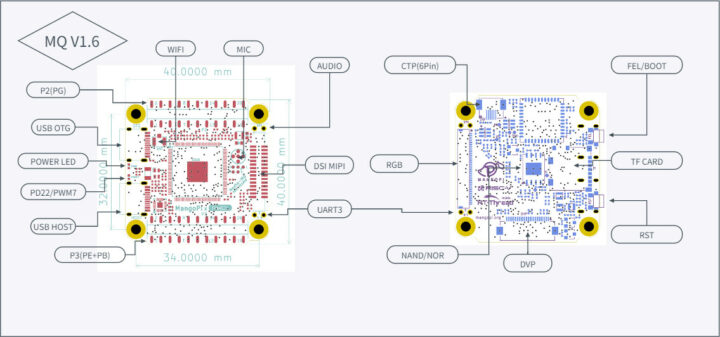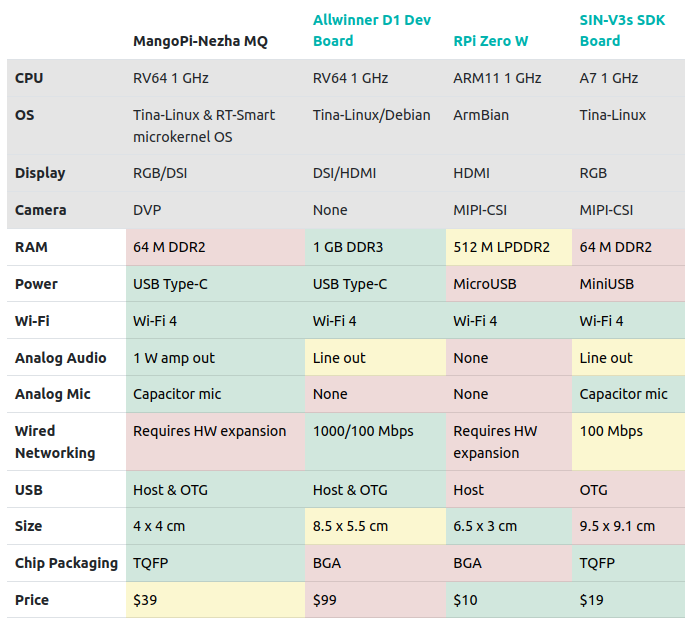MangoPi-Nezha MQ tiny developer board with Allwinner F133-A (aka Allwinner D1s) RISC-V processor with 64MB on-chip RAM has just launched on Crowd Supply for $39, and delivery is expected in July 2022.
The 4x4cm development board comes with a MicroSD card slot, display and camera interfaces, an on-board microphone, as well as WiFi connectivity, two USB Type-C ports, and two 22-pin headers for expansion.
MangoPi-Nezha MQ specifications:
- SoC – Allwinner F133-A 64-bit RISC-V processor @ 1 GHz with 64 MB DDR2
- Storage
- MicroSD card slot
- Footprint for SPI NAND/NOR flash
- Display I/F
- 15-pin FPC connector Raspberry Pi DSI display
- 40-pin FPC connector for RGB display with 4-wire resistive-touch interface
- 6-pin FPC connector for capacitive touch
- Camera I/F – 24-pin DVP interface (usable as RMII)
- Audio – On-board microphone, audio output via 2-pin header (unpopulated)
- Connectivity
- 2.4 GHz WiFi 4 via Realtek RTL8189 module plus u.FL antenna connector
- 10/100Mbps Ethernet (RMII) via DVP camera interface (add-on board)
- USB – 2x USB Type-C ports with one USB OTG port and one USB host port
- Expansion – 2 x 22 pin expansion headers
- Misc – Boot/Fel & Reset buttons
- Power Supply – 5V via USB-C port
- Dimensions – 4×4 cm (four fixed assembly feet)
MangoPi-Nezha MQ RISC-V developer board can run Linux-based operating systems such as Tina Linux (OpenWrt) or lightweight version of Debian, in combination with LVGL open-source graphics library to design GUI on the platform. But since the crowdfunding campaign is managed by RT-Thread, the board can also run RT-Smart described as “a high-performance microkernel operating system for professional, real-time applications”. The company further explains
microkernels fill the gap between traditional real-time operating systems (RTOSs) and heavier solutions like Linux. As a result, platforms like RT-Smart tend to do a better job of balancing real-time performance, cost, security, and startup speed.
Since we’ve written several times about RT-Thread real-time operating system, including a getting started guide for Bluetrum AB32VG1 RISC-V Bluetooth audio board, I asked the company about the differences between RT-Thread and RT-Smart, especially they share the same Github repository, just in different branches. I was pointed to an article on opensource.com that describes both OS, and includes a table showing the main differences (Note RT-Smart used to be called RT-Thread Smart):
RT-Thread | RT-Smart |
|
|---|---|---|
| Supported chips | Cortex-M/R, RISC-V RV32IMAC (and similar), Cortex-A MPU | MPU with MMU, such as ARM Cortex-A and RISC-V |
| Compiling | The kernel and application are compiled into an image program. | The kernel and application can be separately compiled and executed. |
| Memory | Runs on a linear address space (even with MMU) and uses virtual addressing with the physical address | Runs on a 32-bit system with the kernel running on more than 1GB, the user-space process has full 4GB address space, and both are isolated from each other. Peripheral drivers must access peripherals with virtual addresses. |
| Running errors | When an application fails, the overall system collapses. | When an application fails, it does not affect kernel and other process execution. |
| Running model | Multi-thread model | Multiprocess model (multithread is supported within the process, and kernel threads are supported by the kernel) |
| User model | Single-user model |
|
| API | RT-Thread API, POSIX PSE52 | RT-Thread API (on kernel and userspace), plus a full POSIX API |
| Real-time | Preemptive hard real-time system |
|
| Resource utilization | Very small | Relatively small |
| Debugging | Generally debugged through an emulator | Supports GDB debugging and no emulator required |
RT-Thread also compares the MangoPi-Nezha MQ against three other small Arm and RISC-V WiFi boards including the first Allwinner D1 development board, Raspberry Pi Zero W, and the lesser-known SIN-V3S SDK board.
The $39 price tag is not overly attractive here, even with free worldwide shipping. and I assume there may be several reasons with Allwinner trying to ride the RISC-V hype, and profits being shared between RT-Thread for software development and MangoPi for the hardware. A more direct competitor might be the Sipeed Lichee RV RISC-V starter kit that goes for about $23.90 + shipping with Allwinner D1, 512MB RAM, HDMI video output, and a WiFi+Bluetooth module. It should also be noted that a MangoPi MQ Dual is also coming with the same PCB as MangoPi-Nezha MQ, but an Allwinner T113-S3 dual-core Cortex-A7 processor with 128MB RAM replacing the RISC-V processor.

Jean-Luc started CNX Software in 2010 as a part-time endeavor, before quitting his job as a software engineering manager, and starting to write daily news, and reviews full time later in 2011.
Support CNX Software! Donate via cryptocurrencies, become a Patron on Patreon, or purchase goods on Amazon or Aliexpress







